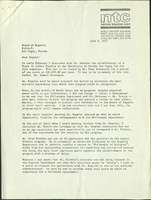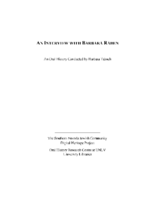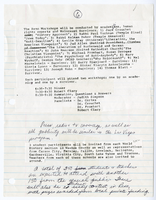Search the Special Collections and Archives Portal
Search Results

Transcript of interview with Henry Kronberg by Barbara Tabach, February 26, 2015 and April 13, 2015
Date
Archival Collection
Description
Interview with Henry Kronberg by Barbara Tabach in two sessions, February 26 and April 13, 2015. In the first session Kronberg talks about his childhood in Germany and Poland and his experience being imprisoned by the Gestapo, and transported to a concentration camp. He survived the Holocaust and met his wife, and they moved to the United States in 1946. He discusses being reunited with his sister in Las Vegas after decades of searching, and moved his family to Las Vegas in 1962. Kronberg talks about becoming involved with Jewish life here, and his wife, Lillian's involvement at Temple Beth Sholom. In the second session, Kronberg discusses purchasing Stoney's, a loan and pawn shop, including some of the clientele and merchandise. He also discusses other social and environmental concerns like anti-Semitism and water resources in Southern Nevada.
Henry Kronberg was born in 1920 and spent his early childhood in a town on the border of Poland and Germany, about 40 miles from Krakow. For years he felt uncomfortable telling his story of surviving the Nazi concentration camps of World War II. Today his name is linked to the Sperling Kronberg Mack Holocaust Resource Center in Las Vegas. And in his soft-spoken manner, Henry recalls his ordeal of loss of family and survival during this most heinous of situations through backbreaking labor and ingenuity. At the end of the war, Henry met the love of his life, Lillian, also a survivor. The two married in 1946 in Frankfurt and immigrated to New Jersey where she had relatives. He describes their difficulties and the various jobs he held until becoming an excellent baker. Then in 1962 an interesting choice took him to a bar mitzvah in Canada. While there the dinner conversation lead him to a great discovery?his sister Lala had survived and was living in Las Vegas. Soon he moved his wife and daughter to Las Vegas. His first foray into business was with his brother-in-law. However, soon it was important to be independent and to control his own destiny. He purchased a going concern, Stoney's Pawn Shop, from Dr. Alexander Coblentz, one of the city's first doctors. He became the fourth owner of Stoney's and operated it until selling it to Steven Mack in 1998. Henry and his wife were active in the Jewish community. They joined Temple Beth Sholom and became fast friends with many of the early leaders of Las Vegas and became a respected member of the secular and Jewish communities.
Text
Audio clip from interview with Marilyn Glovinsky and Melissa Lemoine, April 2, 2015
Date
Archival Collection
Description
Marilyn Glovinsky talks about growing up Jewish in New York "without thinking about it," and the decision to send her daughter to Hebrew School in Las Vegas.
Sound
Audio clip from interview with Justice Michael Cherry, September 19, 2014
Date
Archival Collection
Description
Part of an interview with Justice Michael Cherry on September 19, 2014. In this interview, Justice Cherry discusses connections with Jewish casino operators. He also talks about losing to, then representing, unions in court proceedings. He was later endorsed by the unions when he ran for office.
Sound

Correspondence from and to Lloyd Katz regarding establishment of a Chair in Judaic Studies at UNLV, 1973
Date
Archival Collection
Description
Lloyd Katz's letter to the Board of Regents requests information about the appropriate department in which to establish a Chair of Judaic Studies.
Text

Transcript of interview with Rabbi Bradley Tecktiel by Barbara Tabach, April 19, 2016
Date
Archival Collection
Description
Rabbi Bradley Tecktiel was born June 28, 1968 in Chicago, Illinois. He moved to New York City to attend university, where he received two Bachelor of Arts degrees: one from List College and one from Columbia University. He went on to achieve a Master?s degree from the Jewish Theological Seminary. Soon after graduating in 1996, Rabbi Tecktiel accepted his first clergy position in New Rochelle, New York. From there he went on to lead a congregation in Louisville, Kentucky, before eventually moving to Las Vegas to become the spiritual leader of Midbar Kodesh Temple in 2008. In this interview, Rabbi Tecktiel discusses the path that eventually brought him, his wife, Susan, and their three children to Las Vegas. He talks about his passion for developing Jewish community engagement and programming, and specifically about Midbar Kodesh Temple initiatives, including Yom HaShoah and educational programming. In addition, Rabbi Tecktiel reflects upon the growth of the Jewish community, both those affiliated and unaffiliated, and the impact of Jews on Las Vegas?, as well as Nevada?s, development.
Text
Audio clip from interview with Adele Baratz, 2007
Date
Archival Collection
Description
In this clip, Adele Baratz talks about her parents' experiences in real estate and business ownership in the 1920s and 1930s in Las Vegas.
Sound

Transcript of interview with Bernie and Barbara Kaufman by Barbara Tabach, October 27, 2014
Date
Archival Collection
Description
Bernard ?Bernie? Kaufman and Barbara (Raben) Kaufman were married in 1961 in their childhood home of St. Louis, Missouri, at the ages of twenty-one and nineteen respectively. In 1968, they moved to Las Vegas, joining Bernie?s brother, Herb, in the growing city who had opened the first store. Bernie assisted in managing the family businesses four stores, until they were sold in 1982. At that time, he went into the car rental business; he sold that business in 2000 and then went into airport advertising. Barbara focused herself on raising their children, Carrie and Andrew, and once the children were in their teens, she went to work for her brother as a bookkeeper. In this interview, the Kaufman?s reflect upon their upbringing in St. Louis, where they met and married, and making the decision to move to Las Vegas. They discuss the experience of running the stores and the impact on business as the retail environment changed over the years. The Kaufmans also talk about their involvement with the Jewish community, including B?nai B?rith and Sisterhood, and how it?s grown over the years. They also discuss the impact of the Jewish community members in gaming as well as other sectors, and the increase of congregations over the decades.
Text

Transcript of interview with Barbara Raben by Barbara Tabach, February 24, 2015
Date
Archival Collection
Description
Interview with Barbara Raben by Barbara Tabach on February 24, 2015. In the first part of the interview Raben discusses her involvement with Hadassah in Southern Nevada, and the various groups within that organization. During the second part of the interview, she talks about her family and her relationship to Judaism, and moving to Las Vegas in 1991. Raben discusses the business she built in Los Angeles and Las Vegas called the Candy Factory. She then talks about the formation of Midbar Kodesh with other families from Temple Beth Sholom. Raben continues to be involved in the Jewish community and the Jewish Family Service Agency.
In 1945, Barbara Raben was born to Kermit and Adele Shulman, children of Eastern European emigrants. She enjoyed a happy childhood in Stamford, Connecticut, and was raised with a strong Jewish identity. After attending college in New Jersey, Barbara married Richard Grisar, and the couple lived in London for a year, before returning to Stamford. In 1975, Barbara and Richard moved to Los Angeles where Barbara owned and operated a very successful candy business, Candy Factory. Sixteen years later, Barbara sold her business, and the family relocated permanently to Las Vegas, where her husband owned radio stations. Barbara has always been an active member of the Jewish community, wherever she lived, giving her time to synagogue, children's day school and service organizations. Upon arriving in Las Vegas, Barbara and her family were members of Temple Beth Sholom, before leaving the congregation to start Midbar Kodesh Temple with a small group of other families. She has been an active member of Hadassah Southern Nevada Chapter for over a decade, helping rebuild the organization locally after participating in the Hadassah Leadership Academy, a program designed to engage a younger generation of members. Currently, Barbara serves as board president and interim executive director for Jewish Family Service. In 2004, then a widow, she married Terry Raben. Barbara has four sons with her first husband: Michael, Andrew, David and Marc Grisar.
Text

Grant Application to the Nevada Humanities Committee, circa 1984
Date
Archival Collection
Description
Grant Application to the Nevada Humanities Committee, Inc. for the Nevada Student Conference on the Holocaust and Human Rights.
Text

Transcript of interview with Freddie Glusman by Barbara Tabach, October 29, 2015
Date
Archival Collection
Description
In this interview Glusman discusses his early memories of being raised in Vancouver, Canada and how he ended up in Las Vegas. He reflects on how he first got his start in the town and his early dealings with casinos and their owners while he was working as a carpet and drapery salesman and while working for Fabulous Magazine. Glusman explains how he started his restaurant and tells about the people he encountered while doing this that where significant to both the Jewish community and Las Vegas as a whole. He recounts stories that include such people as Meyer Lansky, Al Sachs, and Moe Dalitz.
Text
